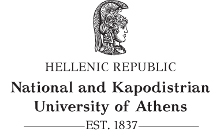Doctoral Dissertation in progress
"The civil liability of the State in cases of damages caused by inescapable natural phenomena"
Commencement date: June 22, 2021
Theoretical and conceptual framework - research plan
The State, as a public authority, has the ability, but also the obligation, to establish rules of law, which regulate the safe and orderly living of citizens, always respecting the relevant constitutional provisions.
However, there are cases in which the State fails to take the necessary - by law - preventive and protective measures, with the result that this omission causes damage to persons and things. In such cases, the State is liable for compensation, in accordance with articles 105 and 106 of the Introductory Law of the Civil Code. The same responsibility lies with the Local Government Organizations (Municipality, Region), as well as the other legal entities of public law. In fact, there is a possibility that the damage will be borne by more than one legal entity governed by public law (article 926 of the Civil Code) and that there is a question of recourse (due to the payment of the entire compensation by one of them) between them (article 927 of the Civil Code). This liability is objective, no fault of the public body is required, and may also include the compensation of the non-material damage of the victim, but also of the mental anguish of the relatives in case of killing of the person (article 932 of the Civil Code).
More specifically, within the meaning of the above provisions, the liability of the State or the legal person of public law for compensation arises not only from the issuance of an unlawful enforceable administrative act or from the unlawful failure to issue such an act, but also from illegal material actions or omissions due to legal material actions, provided that these material actions or omissions are concluded with the organization and operation of public services. In other words, unlawful acts or omissions which are harmful to them must take place in the exercise of the public authority conferred on them and in breach of a provision which has not been adopted solely in the general interest, but which is also intended to protect the right or interest of individual persons. Moreover, there is a liability of the State or the legal person of public law, in compliance with the other requirements of the law, not only when an act or omission of the institution violates a specific provision of law, but also when the specific duties and obligations specific to the specific service and defined by the legislation in force in general, the lessons of common experience and the principles of good faith are omitted.
Furthermore, a necessary condition for the award of damages is, inter alia, the existence of a causal link between the unlawful act or omission or physical action or omission of a material action of the public institution and the damage suffered. A causal link exists when, according to the lessons of common experience, the act or omission is sufficiently capable (appropriate) and is objectively capable of causing the damage in the ordinary and normal course of events and without the intervention of another event.
With regard to the civil liability of the State in cases of damage caused by unavoidable natural phenomena, it follows from the provisions of articles 4 §5 of the Constitution and 105 of the Introductory Law of the Civil Code, in conjunction with the general principles referring to force majeure, that non-compliance or improper compliance with the obligations of the organs of the State and, consequently, liability for compensation, there is in any case of damage to a private individual by the State, unless the latter proves that its institutions have taken the appropriate measures and have done everything objectively possible and the damage is due to an unforeseen and unavoidable event even with measures of utmost diligence and prudence. Moreover, unavoidable natural phenomena (e.g. fire, flood, earthquake) do not, by definition, constitute force majeure causing damage, but only when they occur in a way that cannot be predicted and with such intensity as to make the damage inevitable. Finally, a special - separate responsibility is also the non-implementation of appropriate measures, in accordance with the provisions of legislation, regulations and lessons learned from common experience and human reason, by public bodies after the occurrence of the event giving rise to the damage, in order to prevent such damage from being caused.
All the above issues will be thoroughly investigated in the present doctoral dissertation, along with a simultaneous juxtaposition and analysis of the relevant legislation and jurisprudence, in order to achieve a comprehensive presentation of all aspects of the state's civil liability in cases of damages caused by unavoidable natural phenomena. This issue is original, as on the one hand such cases concern over time and to a large extent the greek legal reality, and on the other hand there is no relevant specific bibliography so far.
